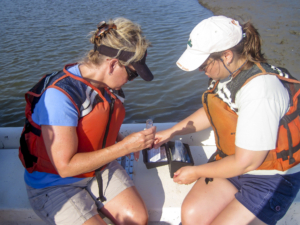Virginia Sea Grant has several new fellowship and professional development opportunities. The goal of these programs is to help develop professional skills and new leaders. Applications must be submitted through their web portal and will open in late August. To learn more about each opportunity, please visit the VASG fellowship page.
Graduate Research Fellowships
VASG Graduate Research Fellowship: The Virginia Sea Grant Graduate Research Fellowship is open to full-time graduate students at any Virginia academic institution who are engaged in coastal and marine research relevant to Virginia and the Virginia Sea Grant strategic plan. In addition to supporting the student’s academic expenses, the fellowship will provide additional professional development opportunities throughout its duration, science-to-management process, team science, outreach, and other Sea Grant activities and mission priorities.
NMFS-Sea Grant Population and Ecosystem Dynamics Fellowship: The Fellowships can provide support for up to three years for highly qualified graduate students working towards a Ph.D. in quantitative ecology, ecosystem ecology, population dynamics or related fields of study such as wildlife biology, fishery biology, natural resource management, marine biology, quantitative ecology, applied mathematics, applied statistics, or simulation modeling. The fellowship emphasizes quantitative marine ecology methods and skills. Candidate projects will focus on at least one of the following: 1) the population dynamics of living marine resources; 2) stock assessment methodologies; 3) marine ecosystem modeling; 4) integrated ecosystem assessments, and 5) ecosystem-based management of marine ecosystems.
NMFS-Sea Grant Marine Resource Economics Fellowship: The Fellowships will provide support for up to two years for highly qualified graduate students working towards a Ph.D. in marine resource economics, natural resource economics, or environmental economics, and who are interested in careers related to the economics of the conservation and management of living marine resources. The overall goals of the program are to 1) encourage qualified applicants to pursue careers in marine resource economics; 2) increase available expertise related to the economic analysis of living marine resource conservation and management decisions; 3) foster closer relationships between academic scientists and NMFS; and 4) provide real-world experience to graduate students and accelerate their career development.
Clark Nexsen Coastal Resilience Research Design Fellowship: Virginia Sea Grant, in partnership with Arcadis, Clark Nexsen, Dewberry, and Ecology and Environment is excited to support a range of paid summer fellowship and internship opportunities focused on coastal resiliency. These opportunities are open to full-time undergraduate and graduate students and are aimed at training students to become leaders in innovative, pre-disaster, resiliency design strategies. Selected fellows will engage in a range of activities and projects related to resilient design and/or coastal flooding adaptation strategies. Opportunities exist throughout the summer to participate in resilience programs with VASG and to collaborate and network with institutional partners, and members of the resilience and adaptation community.
Post-Graduate Fellowships
Commonwealth Coastal and Marine Policy Fellowship: Modeled after the highly successful national Sea Grant Knauss Marine Policy Fellowship, this 12-month paid fellowship is intended to provide educational and professional development opportunities for post-graduates interested in Virginia’s coastal and marine resources. Fellows will receive on-the-job training by working with a Virginia host agency to address pressing coastal and marine resource issues, while learning about the policy and management process occurring at the state level.
Sea Grant Knauss Marine Policy Fellowship: The Knauss Marine Policy Fellowship provides a unique educational experience in the policies and processes of the federal government to graduate students who have an interest in ocean, coastal and Great Lakes resources and in the national policy decisions affecting these resources. Fellows are placed in various executive and legislative branch offices throughout Washington, D.C. The fellowship period is one year beginning in February.
NOAA Coastal Management Fellowship: The Coastal Management and Digital Coast Fellowships provide on-the-job education and training opportunities in coastal resource management and policy for postgraduate students. This two-year opportunity pairs recent graduates with state coastal resource agencies, and nonprofit organizations across the country to work on projects proposed by the hosts, and selected by NOAA’s Office for Coastal Management.
Coastal Resilience Post-Graduate Fellowship: The Coastal Resilience Post-Graduate Fellowship is intended to provide educational and professional development opportunities for post-graduates interested in becoming leaders in innovative, pre-disaster, resiliency design strategies. The selected fellow will receive on-the-job training related to resilient design or coastal flooding adaptation strategies focused on Hampton Roads.

